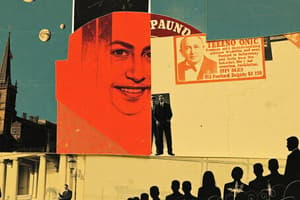Podcast
Questions and Answers
What is the term for a form of performance that tells a story, conveys emotions, and explores human experiences?
What is the term for a form of performance that tells a story, conveys emotions, and explores human experiences?
- Script
- Character
- Theatre
- Drama (correct)
What is the physical space where a drama performance takes place?
What is the physical space where a drama performance takes place?
- Theatre (correct)
- Script
- Character
- Stage
Who is responsible for interpreting the script and guiding the actors' performances?
Who is responsible for interpreting the script and guiding the actors' performances?
- Director (correct)
- Role
- Actor
- Character
What is the term for a spontaneous, unscripted performance often used to develop characters or explore themes?
What is the term for a spontaneous, unscripted performance often used to develop characters or explore themes?
What is the term for a speech delivered by a single actor, often to express their thoughts or feelings?
What is the term for a speech delivered by a single actor, often to express their thoughts or feelings?
What is the term for the sequence of events that make up the story of a drama?
What is the term for the sequence of events that make up the story of a drama?
What is the term for the process of creating and portraying a character's personality, traits, and backstory?
What is the term for the process of creating and portraying a character's personality, traits, and backstory?
What is the term for a style that aims to recreate real-life situations and characters?
What is the term for a style that aims to recreate real-life situations and characters?
Flashcards are hidden until you start studying
Study Notes
IGCSE Drama Glossary
Key Terms
- Drama: a form of performance that tells a story, conveys emotions, and explores human experiences
- Theatre: the physical space where a drama performance takes place
- Script: the written text of a drama, including dialogue and stage directions
- Character: a person or role portrayed by an actor in a drama
- Role: a part or function played by an actor in a drama
- Actor: a person who performs a role in a drama
- Director: the person responsible for interpreting the script and guiding the actors' performances
- Stage: the area where the drama takes place, including the setting, props, and actors
Drama Techniques
- Improvisation: spontaneous, unscripted performance, often used to develop characters or explore themes
- Mime: a technique that uses silent, exaggerated movements to convey emotions and actions
- Pantomime: a type of drama that uses exaggerated gestures, facial expressions, and body language
- Monologue: a speech delivered by a single actor, often to express their thoughts or feelings
- Dialogue: conversation between two or more characters in a drama
Drama Elements
- Plot: the sequence of events that make up the story of a drama
- Theme: the underlying idea or message explored in a drama
- Characterization: the process of creating and portraying a character's personality, traits, and backstory
- Setting: the time and place in which a drama takes place
- Props: objects used by actors to support the drama and enhance the performance
Performance Styles
- Realism: a style that aims to recreate real-life situations and characters
- Naturalism: a style that focuses on the everyday, mundane aspects of life
- Stylization: a style that uses exaggerated or distorted elements to create a specific effect
- Abstract: a style that uses non-realistic, symbolic, or experimental elements to convey meaning
Drama Basics
- Drama is a form of performance that tells a story, conveys emotions, and explores human experiences
- Theatre refers to the physical space where a drama performance takes place
Script and Performance
- A script is the written text of a drama, including dialogue and stage directions
- Character refers to a person or role portrayed by an actor in a drama
- Role is a part or function played by an actor in a drama
- An actor is a person who performs a role in a drama
- A director is responsible for interpreting the script and guiding the actors' performances
Performance Space
- The stage is the area where the drama takes place, including the setting, props, and actors
Drama Techniques
Improvisation and Mime
- Improvisation is spontaneous, unscripted performance, often used to develop characters or explore themes
- Mime is a technique that uses silent, exaggerated movements to convey emotions and actions
- Pantomime is a type of drama that uses exaggerated gestures, facial expressions, and body language
Dialogue and Monologues
- Dialogue refers to conversation between two or more characters in a drama
- A monologue is a speech delivered by a single actor, often to express their thoughts or feelings
Drama Elements
Story and Theme
- The plot is the sequence of events that make up the story of a drama
- Theme refers to the underlying idea or message explored in a drama
Character and Setting
- Characterization is the process of creating and portraying a character's personality, traits, and backstory
- The setting is the time and place in which a drama takes place
Props
- Props are objects used by actors to support the drama and enhance the performance
Performance Styles
Realism and Naturalism
- Realism is a style that aims to recreate real-life situations and characters
- Naturalism is a style that focuses on the everyday, mundane aspects of life
Stylized and Abstract
- Stylization is a style that uses exaggerated or distorted elements to create a specific effect
- Abstract is a style that uses non-realistic, symbolic, or experimental elements to convey meaning
Studying That Suits You
Use AI to generate personalized quizzes and flashcards to suit your learning preferences.




